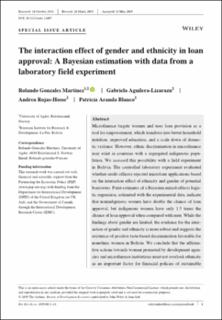| dc.contributor.author | Gonzales Martinez, Rolando | |
| dc.contributor.author | Aguilera-Lizarazu, Gabriela | |
| dc.contributor.author | Rojas-Hosse, Andrea | |
| dc.contributor.author | Aranda Blanco, Patricia | |
| dc.date.accessioned | 2020-03-29T11:30:09Z | |
| dc.date.available | 2020-03-29T11:30:09Z | |
| dc.date.created | 2019-08-09T12:54:15Z | |
| dc.date.issued | 2019 | |
| dc.identifier.citation | Gonzales Martinez, R., Aguilera-Lizarazu, G., Rojas-Hosse, A. & Aranda Blanco, P. (2019). The interaction effect of gender and ethnicity in loan approval: A Bayesian estimation with data from a laboratory field experiment. Review of Development Economics, 24(3), 726-749. | en_US |
| dc.identifier.issn | 1467-9361 | |
| dc.identifier.uri | https://hdl.handle.net/11250/2649243 | |
| dc.description.abstract | Microfinance targets women and uses loan provision as a tool for empowerment, which translates into better household nutrition, improved education, and a scale down of domestic violence. However, ethnic discrimination in microfinance may exist in countries with a segregated indigenous population. We assessed this possibility with a field experiment in Bolivia. The controlled laboratory experiment evaluated whether credit officers rejected microloan applications based on the interaction effect of ethnicity and gender of potential borrowers. Point estimates of a Bayesian mixed‐effects logistic regression, estimated with the experimental data, indicate that nonindigenous women have double the chance of loan approval, but indigenous women have only 1.5 times the chance of loan approval when compared with men. While the findings about gender are limited, the evidence for the interaction of gender and ethnicity is more robust and suggests the existence of positive taste‐based discrimination favorable for nonethnic women in Bolivia. We conclude that the affirmative actions towards women promoted by development agencies and microfinance institutions must not overlook ethnicity as an important factor for financial policies of sustainable development. In practice, these policies should be aimed at identifying and reducing both social desirability bias and the structural barriers to financial inclusion that indigenous women may face when trying to obtain access to a loan. | en_US |
| dc.language.iso | eng | en_US |
| dc.publisher | Wiley | en_US |
| dc.rights | Navngivelse-Ikkekommersiell 4.0 Internasjonal | * |
| dc.rights.uri | http://creativecommons.org/licenses/by-nc/4.0/deed.no | * |
| dc.title | The interaction effect of gender and ethnicity in loan approval : A Bayesian estimation with data from a laboratory field experiment | en_US |
| dc.type | Journal article | en_US |
| dc.type | Peer reviewed | en_US |
| dc.description.version | publishedVersion | en_US |
| dc.rights.holder | © 2019 The Author(s) | en_US |
| dc.subject.nsi | VDP::Samfunnsvitenskap: 200::Økonomi: 210::Samfunnsøkonomi: 212 | en_US |
| dc.source.pagenumber | 726-749 | |
| dc.source.volume | 24 | |
| dc.source.journal | Review of Development Economics | en_US |
| dc.source.issue | 3 | |
| dc.identifier.doi | https://doi.org/10.1111/rode.12607 | |
| dc.description.localcode | Paid Open Access | |
| dc.description.localcode | UNIT agreement | |
| cristin.qualitycode | 1 | |

